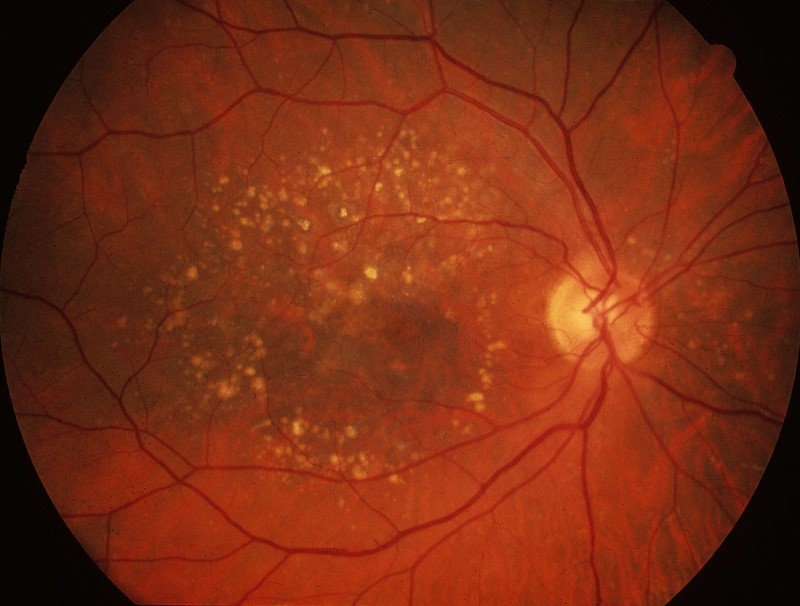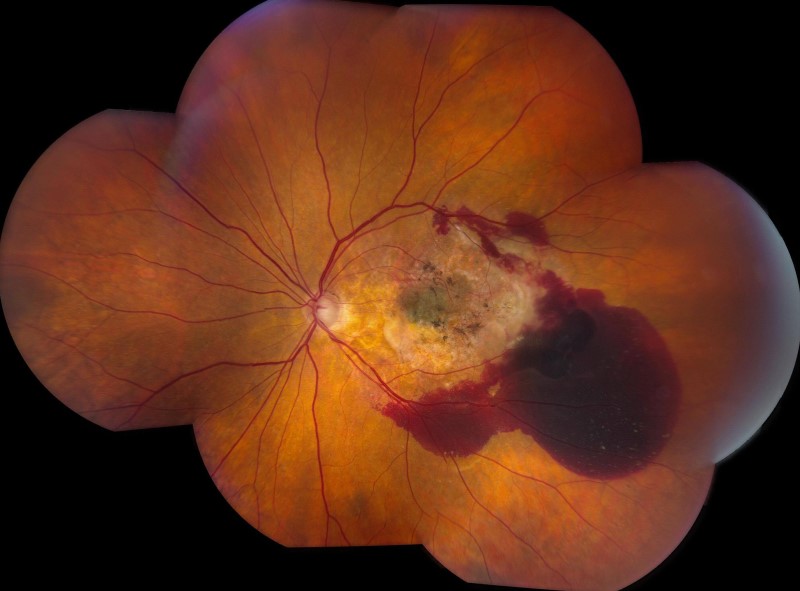Macular Degeneration
What is Macular Degeneration?
Macular degeneration, often referred to as AMD (Age-related Macular Degeneration), is a progressive eye disease that affects the macula, a small but crucial part of your retina responsible for central vision. This condition can lead to significant vision impairment and is a leading cause of vision loss among individuals aged 50 and older.
Macular degeneration comes in two main forms:
Dry AMD: This is the more common type and is characterized by the gradual breakdown of light-sensitive cells in the macula. It can result in blurry or distorted central vision, making activities like reading and recognizing faces difficult.

Dry Macular Degeneration
Copyright notice: This image was originally published in the Retina Image Bank® website ©
Author: Henry Kaplan, MD Photographer: Henry Kaplan, MD
Title: Dry AMD, Year: 2014, Image Number: 18286
©The American Society of Retina Specialists
Wet AMD: Although less common, wet AMD is more severe and occurs when abnormal blood vessels grow beneath the macula. These vessels can leak blood and fluid, causing sudden and rapid vision loss, often within weeks or months.

Wet Macular Degeneration
Copyright notice: This image was originally published in the Retina Image Bank® website
Author: Jason Calhoun, Photographer: Jason Calhoun
Title: Macular Degeneration With Hemorrhage, Year: 2013, Image Number: 7263
©The American Society of Retina Specialists.
Macular degeneration can have a profound impact on your daily life, but understanding the condition and its treatment options can help you manage its effects effectively.
How is Macular Degeneration Treated?
Managing macular degeneration involves a combination of lifestyle changes, medical interventions, and ongoing eye care. While there is no cure for AMD, various treatment options can help slow its progression and improve your quality of life:
- Lifestyle Modifications: Maintaining a healthy lifestyle can play a significant role in managing AMD. Eating a balanced diet rich in antioxidants, protecting your eyes from harmful UV rays, and avoiding smoking are essential steps to reduce your risk and slow the progression of the disease.
- Nutritional Supplements: Some individuals with AMD may benefit from specific nutritional supplements, such as those containing vitamins and minerals like zinc and antioxidants. These supplements can help support eye health and slow the progression of the condition.
- Intravitreal Injections: For those with wet AMD, injections can be a highly effective treatment option. These injections help reduce abnormal blood vessel growth and leakage, preserving central vision.
- Low Vision Aids: If macular degeneration has caused significant vision loss, low vision aids like magnifiers, special glasses, and electronic devices can help maximize your remaining vision and maintain independence in daily activities.
- Regular Eye Checkups: Early detection and monitoring are crucial in managing macular degeneration. Regular eye examinations by an ophthalmologist or optometrist can help identify changes in your condition and guide treatment decisions.
At Texas Macula & Retina, we understand the impact that macular degeneration can have on your life, and we are committed to providing comprehensive eye care and the latest treatment options. Our experienced team is here to support you in your journey to maintain your eye health and preserve your vision.
If you or a loved one are concerned about macular degeneration or seeking personalized guidance on treatment options, please don’t hesitate to contact us. Together, we can work towards a brighter and clearer future for your vision.

